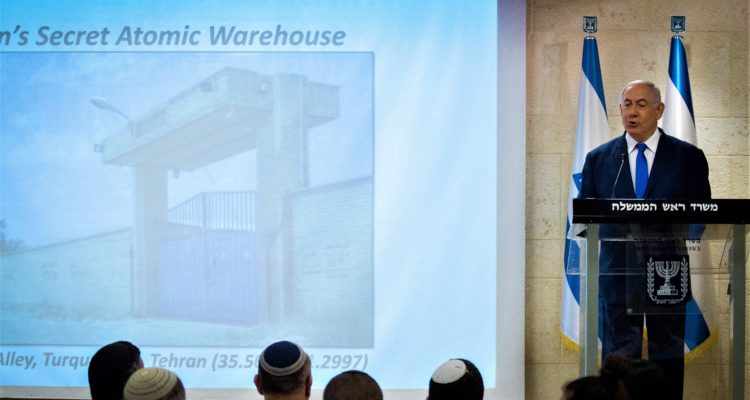The Israeli leader revealed satellite photos and other evidence of an Iranian nuclear weapons site that Tehran allegedly attempted to conceal from the world.
By World Israel News Staff and AP
Israeli Prime Minister Benjamin Netanyahu unveiled on Monday evidence of a previously undisclosed Iranian nuclear weapons site.
“Today, we reveal that yet another secret nuclear site was exposed in the archives that we brought from Tehran. In this site, Iran conducted experiments to develop nuclear weapons. This is the site near Abadeh, south of Isfahan,” Netanyahu explained during a press conference.
“When Iran realized that we uncovered the site here’s what they did: they destroyed the site. They just wiped it out,” he added, explaining that the facility was discovered based on records that Israel seized from an Iranian nuclear warehouse early last year in a raid during which Mossad agents spirited out of Iran a “half-ton” of nuclear documents.
Among the evidence Netanyahu presented on Monday were satellite photos of a facility in the southern Fars province’s Abadeh area in June, followed by a second photo of the site being destroyed in July, after the Iranians realized they’d been discovered.
“They wiped out the site. Here they conducted nuclear experiments for nuclear weapons. This is the site after they understood that we were on to them. They destroyed the evidence or at least tried to destroy the evidence,” Netanyahu explained.
‘Israel knows what you’re doing’
Speaking directly to Tehran, the prime minister intoned, “Israel knows what you’re doing, Israel knows when you’re doing it, and Israel knows where you’re doing it.”
“We will continue to expose your lies,” said Netanyahu. “What we see is a consistent pattern of Iranian lies, deception and violations.”
Netanyahu also confirmed that uranium traces were found at a Turquzabad facility he identified last year, referring to a report the previous evening that that the IAEA inspected the site in April and found radioactive material, including uranium, which is a key ingredient for developing nuclear bombs.
That information was communicated by Reuters, which based its report on the word of two diplomats familiar with the IAEA’s work.
“A year and a half ago, we exposed Iran’s secret nuclear archive which revealed that Iran was developing five nuclear warheads as early as 2003. Last year, we exposed Iran’s secret nuclear warehouse in Turquzabad which Iran used for storing materials and equipment for its secret nuclear program,” Netanyahu noted.
According to Netanyahu, Iran knew that Israel was “on to them so they cleared the site,” adding “They cleared it of these capacities, they cleared them, and then they actually covered up the site. This is an actual cover-up. They put gravel on it to try and hide their traces. But they didn’t. The IAEA found traces of uranium that Iran hid in these sites. That’s a direct violation of the NPT, the Non-Proliferation Treaty.”
More cracks emerge in the Iran deal
These developments arrive on the heels of recent reports that Iran has stopped cooperating with the IAEA’s nuclear inspectors who provide oversight on the Islamic Republic’s weapons program.
In a September 2018 speech at the United Nations, Netanyahu revealed that Iran had kept 15 kilograms of radioactive material at the warehouse, but moved the material to a different location in the area “to hide the evidence.”
Before concluding the press conference, Netanyahu urged the international community to exert “pressure, pressure and more pressure” on Tehran and to support U.S. President Donald Trump’s sanctions on the Islamic Republic.
Earlier on Monday, the IAEA confirmed that Iran is preparing to use more advanced centrifuges, another breach of limits set in the country’s slowly unraveling nuclear deal with major powers.
Iran had already announced the step, its latest violation of the 2015 agreement as it tries to pressure European signatories to find a way to maintain oil shipments and ease the toll of U.S. sanctions on the Iranian economy.
The IAEA reported its inspectors verified the installation of new centrifuges. The agency said all had been “prepared for testing” but none yet tested at the time of the Sept. 7-8 inspection.





